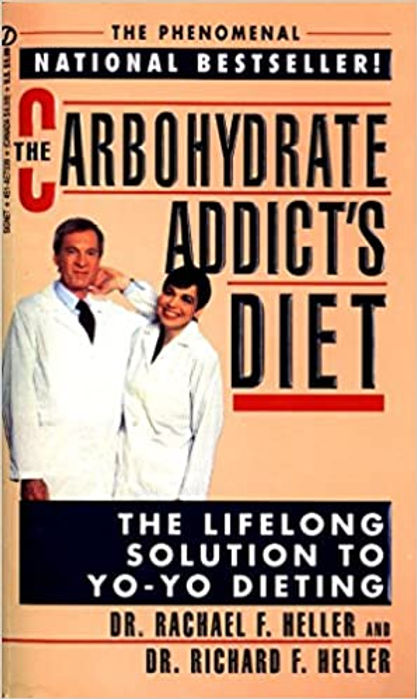Book
The Carbohydrate Addict's Diet: The Lifelong Solution to Yo-Yo Dieting
Publish date:
March 1, 1993
* After eating a full breakfast, are you hungrier before it's time for lunch, than you would be if you only had time for a cup of coffee?
* Do you have a hard time stopping once you start to eat bread, pasta, or sweets?
* Do you have a tendency to gain weight easily, or if you lose weight, to gain it back again?
If you answered yes to one or more of these questions, you may not be experiencing a lack of willpower but rather a physical addiction to carbohydrates--a compelling or recurring craving for starches, snack foods, or sweets. Now, Drs. Richard and Rachael Heller of the Mount Sinai School of Medicine in New York have discovered a revolutionary new diet that eliminates the cravings and helps you to overcome the yo-yo syndrome--permanently--without deprivation. based on the Hellers' nine years of research, thousands of case studies, and their own personal victories over cravings and weight (maintaining a 200 pound loss between them!), this healthful, unique diet features a pleasurable way that adapts to your lifestyle and does away with measuring, food exchanges and calorie counting. A daily Reward Meal, along with wholesome, balanced Complementary Meals, fit easily into busy schedules, restaraunt meals, holiday celebrations, and vacations.
Filled with sound advice and effective strategies--including wonderful recipes and menu plans--this groundbreaking book helps eliminate carbohydrate cravings and puts you in control of your eating and your weight--for life.
http://carbohydrateaddicts.com/adefinedandcause.html
CARBOHYDRATE ADDICTION DEFINED:
A compelling hunger, craving, or desire for carbohydrate-rich foods;
an escalating, recurring need or drive for starches, snack foods, junk food, or sweets.Carbohydrate-rich foods include, but are not limited to: breads, bagels, cakes, cereal, chocolate, cookies, crackers, danish, fruit and fruit juice, ice cream, potato chips, pasta, potatoes, pretzels, rice, pie, popcorn, and sugar-sweetened beverages.
In addition, carbohydrate act-alikes (sugar substitutes, alcoholic beverages, and monosodium glutamate) may trigger intense or recurring carbohydrate cravings and/or weight gain.
As many as seventy-five percent of those who are overweight, and many normal-weight individuals as well, are carbohydrate addicted. Though many people may suspect there is a physical imbalance that makes them crave carbohydrates and put weight on easily, the underlying cause of their cravings and weight struggles often goes undiagnosed and untreated.
CARB ADDICTION: THE CAUSE
Carbohydrate addiction is caused by an imbalance - an over release of the hormone, insulin, when carbohydrate-rich foods are eaten. Among its many jobs, insulin signals the body to take in food (it has been called the "hunger hormone") and, once the food is consumed, signals the body to store the food energy in the form of fat.
Too much insulin results in too strong an impulse to eat, too often, and a body that too readily stores food in the form of fat.
The scientific term for this condition is post-prandial reactive hyperinsulinemia which means too much insulin is released after eating. Over time, people who are hyperinsulinemic become insulin resistant, that is, the cells in their muscles, nervous systems, and organs start to close down to the high levels of insulin in their blood. Insulin is no longer able to open the doors to these cells and allow food energy (blood sugar or glucose) to enter. At this point, one may experience symptoms of low-blood sugar levels (hypoglycemia) including irritability, shakiness, tiredness, intense cravings, confusion, and headaches. Since the blood sugar cannot easily enter the muscles, nervous system, or organs, much of the food energy gets channeled into the fat cells and weight gain comes easily. Over time, however, as high insulin levels continue, even the fat cells can shut down and the blood glucose gets trapped in the blood stream bringing on the condition known as adult-onset diabetes.
At this time, there is no accepted blood test to definitively determine whether or not your are carbohydrate addiction. Fasting insulin levels do not necessarily predict how your body will react after eating carbohydrate-rich foods. Glucose tolerance tests check how you body responds after consuming sugars but, unfortunately, they use highly sweetened drinks that are not the equivalent of typical carbohydrate-rich meals. If you are carbohydrate addicted, chances are, you already know that there is something different about the way your body responds to starches, snack foods, junk food, and sweets.
Many carb addicts describe their experience with carbs to flipping on a “light switch,” awakening an “intense, undeniable, irresistible need.” When carb addicts take the first bite, it’s almost impossible to stop. The first bite can feel like taking the first breath when you’ve been starved of air.
We have found that the best way to determine if you (or someone you love) is carb addicted is to take the full test in our book, The Carbohydrate Addicts LifeSpan Program. We included a shortened version of the test, The Carb Addict’s Quick Quiz that you can access through the link at the top of the page. This short quiz is not as detailed as the test you will find in our book, but it can give you a good idea as to whether your insulin levels may have been triggering an addiction to carbs and sabotaging your chances for success.
Authors
Image | Author | Author Website | Twitter | Author Location |
|---|


